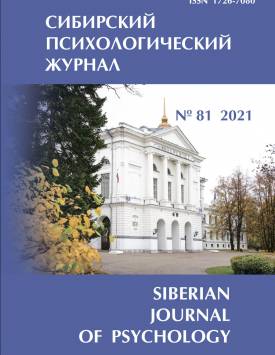Dynamics of Students’ Intellectual and Personal Development during their Transition from Primary to Secondary School
Traditionally, the transition from elementary to secondary school is regarded as a boundary separating childhood from adolescence. It is usually characterized by the fact that the inevitable adaptation to new social conditions happens amid motivational crisis and, in general, becomes a time of serious change in children’s psyche. The purpose of the study was to determine the dynamics of the intellectual potential development, motivation and personal qualities of students during their transition from the 4th to the 5th grade. We examined three transition periods from the 4th to the 5th grade since 2016 to 2020. Each transition period involved three classes marked A, B and C. In total, the article presents the results for 261 students. The study was conducted using the Amthauer test (IST), the 16PF test by R. Cattell modified by L. Yasyukova, and the diagnosing method for the school motivation type by E. Lepesheva. The results obtained allow us to draw the following conclusions. 1 During the transition, children experience a period of adaptation, which is generally successful. 2. Students experience a distinct motivational crisis during their 5th grade. Further studies are necessary to understand the reasons of it. At this point, we are able to give several explanations for the results. These are: a) Loss of interest in learning indicates the onset of an age crisis in younger adolescents; during the 5th grade, the crisis grows and matures (according to the views of L. S. Vygotsky). The analysis of motives to educational activities indicates the absence of a clearly expressed leading activity during this period. We can assume that learning loses its significance as a leading activity in the 5th grade because it gives way to communication with other children. b) The reasons for losing the motivation to educational activities are the limits and gaps in the educational system of primary school (possibly, secondary school too), which does not take into account the features and logic of value and motivational mechanisms in educational activities of students. 3. New learning system has a positive effect on the cognitive development of 5th-graders. There is an increase in independent thinking and conceptual thinking. The teacher’s role is very important as well as organization of educational process. 4. Fifth grade is a time of self-awareness development. Changes in the personality of 5th-graders begin with the development of self-criticism and promptness. At the same time, the development of thinking, although it determines this process, does not guarantee its immediate start. There is no connection between the development of thinking in the classroom and personal changes. The organization of educational work in the classroom becomes a crucial link. 5. A relationship between motivation for educational activities and personal characteristics of students was found. The main role in it plays a strong-willed self-control and carelessness of younger teenagers. The development of these qualities is able to raise different types of the motives in training activities.
Keywords
younger teenagers, motivation for educational activity, intellectual operations, personal qualities of students, self-awarenessAuthors
| Name | Organization | |
| Zimina Natalia A. | Nizhny Novgorod State University of Architecture and Civil Engineering | n.a.zimina@yandex.ru |
References

Dynamics of Students’ Intellectual and Personal Development during their Transition from Primary to Secondary School | Sibirskiy Psikhologicheskiy Zhurnal – Siberian Journal of Psychology. 2021. № 81. DOI: 10.17223/17267081/81/8
